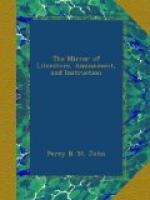The third criminal entered. This was a young man of prepossessing exterior, who had recently moved in a higher sphere than either of his companions in suffering. His cheek was flushed when he entered, and he staggered forward, writhing in agony, and scarcely able to sustain himself. He looked at those who surrounded him as if he feared to discover some who had known him in the day of his pride. It was necessary to support him while his irons were being removed. He was attended by a benevolent person who commonly assists criminals in their last moments, and who, though no ecclesiastic by profession, seemed equal to the duty of imparting religious consolation. His voice now contributed to soothe his unhappy charge, and in a few moments all that was necessary there to be done had been performed. The hands of the culprits were secured, and the halters by which they were to perish were thrown round their shoulders.
The fortitude of the young man first brought in had, till this moment, enabled him, though not unmoved, to look with calmness on the appalling scene. But now when he saw that but one more ceremony intervened between him and the grave, his resolution suddenly failed him. He burst into tears, and a wild shriek of “O my mother—my poor mother,” embodied in speech a portion of the agony which raged in his bosom. He was conducted to a bench, on which his fellows had just been seated. A glass of water was handed to him, with which he moistened his fevered lips, and the voice of devotion again claimed attention, and commanded silence.
In that moment few, if any, of the spectators remembered the crimes of those they looked upon. Every mind was solely occupied with the terrible punishment about to be inflicted.




